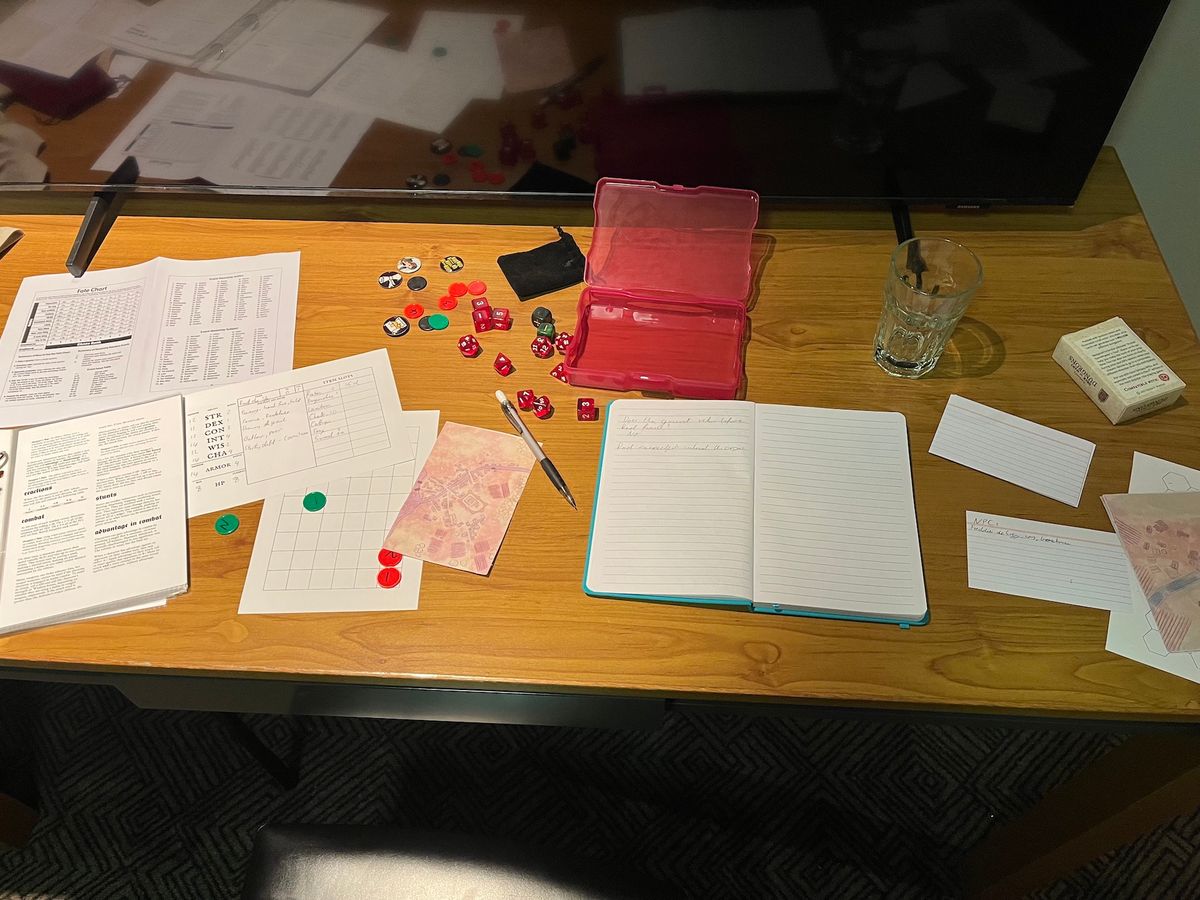Solo tabletop roleplaying
After playing a solo roleplaying session in Sydney, I consider the pros and cons of using game mechanics to write narrative fiction.

Last week, I travelled to Sydney for work, and didn't have enough room to pack my work and personal laptops, which ruled out writing my novel. Instead, I packed my Kobo and a portable TTRPG kit with a plan to entertain myself by reading and solo roleplaying.
My kit was fun to build, comprising:
- Knave 1e, a rules-lite OSR game with a couple of third-party extensions, printed on A5 paper.
- A one-page printout of the Mythic GM Emulator.
- Character sheets and grid paper (squares and hexes).
- Some blank and lined index cards.
- A notebook.
- A set of dice and tokens.
- Some DIY settlement maps printed on index cards.
- Axebane’s Deck of Many Dungeons.
- A pen and a mechanical pencil.
The kit broke down nicely into a small box and the document compartments of my travel bag. Considering I pulled it together in haste, I was pleased with it, but the experience taught me that a little more planning and preparation could have made the session even better.
Firstly, the material I gathered wasn’t optimised for A5 or even the session I planned on playing. Knave’s a fantastic toolkit for a traditional tabletop game, but it’s not designed for solo play or roll and write. That’s where Mythic was supposed to help, but I didn’t bring enough of it with me, and I suspect Scarlet Heroes’ would have better served me as its solo gaming chapter is much better structured.
I planned to crawl through a dungeon using Axebane’s deck, but Mythic and my tendencies led me down a more narrative path, and I didn’t get that far. Instead, I penned a few scenes about a petty criminal mixed up in a popular uprising to overthrow the corrupt Baron of Saltguard. This might make an interesting basis for a novella…
Mythic is excellent for pushing you in directions you might not have explored. But as the narrative unfolded, I relied on my phone to access online NPC and name generators because I didn’t have enough in my kit. That was a little disheartening as I wanted a screen-free experience.
Regardless, I had fun… but as the session unfolded and retrospect crystallised my thoughts, I realised that I wasn’t playing a game. It felt like I was planning a story and only using dice and generative tools to seed inspiration or move the plot forward. Had I managed a dungeon or hex crawl with some gridded combat, I might have felt differently, but I was left wondering why I didn’t abandon the idea of gaming and writing a story. Maybe I’m not enough of a gamer to appreciate solo play, or perhaps framing a narrative within the confines of a game system is something I intuitively find to be inefficient.
That’s not to say that dice, oracles and generative tools aren’t helpful to writers. The explosion of AI use among writers proves otherwise. After all, generative AI like ChatGPT is just a more extensive, more intelligent, randomising engine that happens to understand language well enough to act as a pseudo-GM.
Tools like these can help a writer break free of well-worn tropes and conventions and add an element of uncertainty to a narrative. Most writers don’t set out to kill their protagonists, but if their fate is determined by the roll of dice rather than the author’s predetermined plot outcome, then it’s a distinct possibility.
Mixing narrative with game mechanics isn’t new, and I first encountered it when Fighting Fantasy books hit the market during my teenage years. These were inspired by D&D and published for those who couldn’t find traditional tabletop games. The idea lives on in LitRPG and Progressive Fantasy, which blends conventional narrative media with game mechanics. FF books were great but had limited outcomes; LitRPG and PF have no such constraints. Maybe that’s a more appropriate avenue for me than trying to recreate a style of gaming that’s best played in a group.
In either case, the lines between game and fiction are blurred, and there’s no right or wrong way to engage in the hobby. You can play game-heavy, with maps and minis and nothing more than bullet points to track your progress. Or you can play narrative-heavy, writing scenes and dialogue in prose, using dice and oracles to add randomness, and a character sheet to ground and progress your characters’ abilities.
Regardless of where you stand, it’s fun to try. If you’re from a traditional gaming background, solo gaming can help you plan sessions for your table, practice your roleplaying skills, or keep you engaged in the hobby if you can’t find or rely on others to play with. As a writer, introducing game mechanics and generative resources can break up the monotony of writing novels and help overcome writer’s block or the tendency to fall back on tropes.
What do you think? I’d love to hear your thoughts.